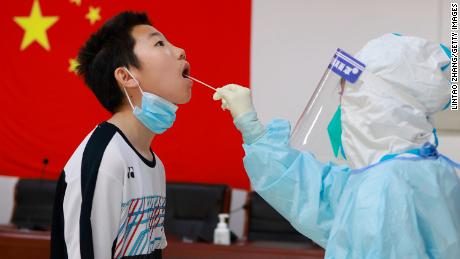At a meeting chaired by Xi on Thursday, the ruling Communist Party’s supreme Politburo Standing Committee vowed to “unswervingly adhere to the general policy of ‘dynamic zero-Covid,’ and resolutely fight against any words and acts that distort, doubt or deny our country’s epidemic prevention policies.”
This is the first time Xi, who according to state media made an “important speech” at the meeting, has made public remarks about China’s battle against Covid since public furor erupted over the harsh lockdown in Shanghai.
“Our prevention and control strategy is determined by the party’s nature and mission, our policies can stand the test of history, our measures are scientific and effective,” the seven-member committee said, according to government news agency Xinhua.
“We have won the battle to defend Wuhan, and we will certainly be able to win the battle to defend Shanghai,” it said.
The Standing Committee also demanded cadres have a “profound, complete and comprehensive understanding” of the policies set by the party’s central leadership.
“We should resolutely overcome the problems of inadequate awareness, inadequate preparation and insufficient work, and resolutely overcome contempt, indifference and self-righteousness in our thinking,” it said.
To analysts who have long observed Chinese politics, the stern warning is a sign that there has been internal pushback against Xi’s zero-Covid policy from within the party.
“This language should be read as a direct criticism of unspecified local CCP leaders who have questioned the policies at the center, or who have been insufficiently successful in applying them,” wrote David Bandurski, co-director of the China Media Project.
“And it is difficult not to hear in this phrase about ‘self-righteousness’ condemnation of leaders in Shanghai in particular,” Bandurski added.
Over the past five weeks, many Shanghai residents have taken to social media to call for help and vent their anger over severe food shortages and lack of access to medical care. Some protested from their windows, banging pots and pans and shouting in frustration, others even clashed with police and health workers in the streets — a rare scene in a country where dissent is routinely suppressed.
The grave economic fallout has also drawn concerns from economists and business executives, especially given Shanghai’s role as the country’s leading financial center and a major manufacturing and shipping hub. In April, China’s services sector, which accounts for more than half of the nation’s GDP and over 40% of its employment, contracted at the second sharpest pace on record, while the manufacturing sector also shrunk.
And as Omicron spreads in other parts of China, more local governments are imposing swift lockdowns in response to just a handful of cases. In Beijing, where more than 500 cases have been reported since April 20, many fear for a Shanghai-style lockdown as authorities roll out increasingly restrictions.
But the latest statement from the country’s top leaders has made it clear that the Chinese government is doubling down on its approach of relying on swift lockdowns, mass testing and quarantine to squash the highly transmissible Omicron variant for the foreseeable future.
Wu Qiang, a political analyst in Beijing, said since April, the question over how the government should deal with the country’s worst outbreak since Wuhan has evolved into a “path struggle” within the party.
“Firstly, it is a struggle over whether it should choose ‘dynamic zero-Covid’ or a more flexible approach to fight Covid; and secondly, it is also a struggle over whether to make Covid control or economic growth the priority,” Wu said.
And with the latest statement, it is clear that Xi has picked the former in both “struggles,” according to Wu.
Xi has put his personal stamp on China’s zero-Covid strategy, with state media often reporting that he has “personally commanded and made arrangements” for the country’s fight against the pandemic.
“In that sense, zero-Covid has become an unquestionable, unchallengeable policy that is closely tied to his political authority — and therefore there will be no flexibility when it comes to its implementation,” Wu said.



